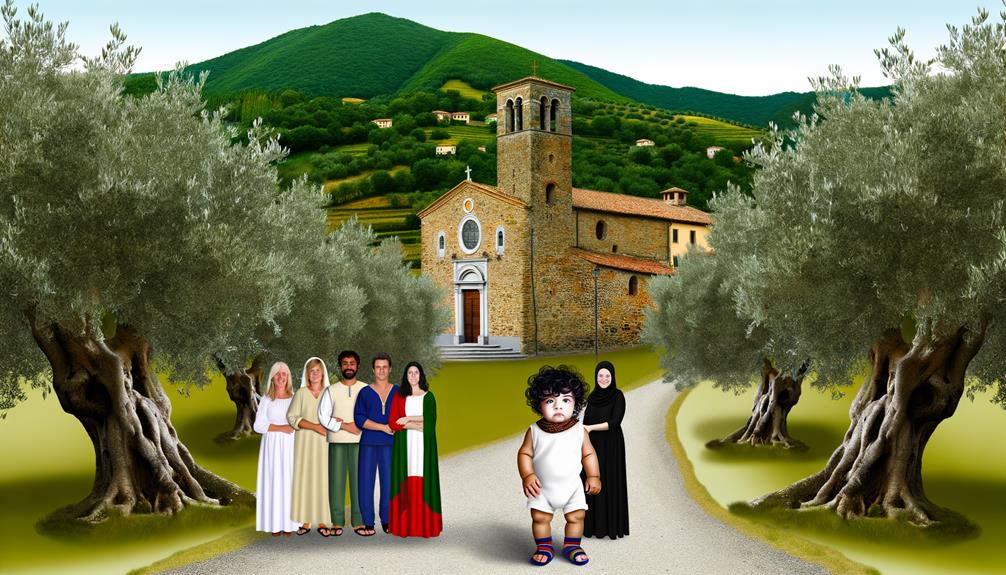Giancarlo Name Meaning and Origin
Giancarlo, an Italian name of profound historical and cultural significance, combines 'Giovanni' (God is gracious) and 'Carlo' (free man). Originating from Italy, this compound name reflects deep religious connotations and a sense of nobility.
Giovanni's influence underscores a divine grace, while Carlo represents liberty and individuality, together encapsulating a rich linguistic and cultural tradition. The name has enjoyed periods of popularity, particularly within Italian and Italian-American communities, and has been popularized by notable figures in various fields.
For deeper insights on its etymological nuances and modern relevance, there's much more to uncover.

Key Takeaways
- Giancarlo is an Italian name combining 'Giovanni' (God is gracious) and 'Carlo' (free man).
- The name reflects deep cultural and historical Italian significance.
- It carries a religious connotation and noble heritage.
- Notable figures like Giancarlo Esposito and Giancarlo Stanton have popularized the name.
- Giancarlo is popular in Italian communities and is gaining global appeal.
Historical Background
The name Giancarlo has its roots in Italian tradition, combining the elements 'Gian' and 'Carlo,' which can be traced back to centuries-old practices of name formation in Italy.
This compound name emerged from a cultural milieu where names were often created by merging shorter forms or diminutives of existing names, reflecting familial connections and religious devotion.
'Gian' is a contraction of 'Giovanni,' itself derived from the Latin 'Ioannes,' meaning John. 'Carlo' corresponds to the Italian variant of Charles, originating from the Germanic 'Karl.'
This synthesis of names is not merely a linguistic artifact but also a window into historical naming conventions that emphasized both individuality and lineage, encapsulating broader societal values and traditions in Italian heritage.
Meaning of Giancarlo
The name Giancarlo, a fusion of the Italian names Giovanni and Carlo, embodies rich linguistic roots and etymology, signifying 'God is gracious' and 'free man' respectively.
Its cultural and historical significance is deeply intertwined with Italian heritage, where it has been borne by notable figures throughout centuries.
Modern usage and interpretations reflect its enduring appeal, maintaining a presence in contemporary naming conventions while honoring its traditional connotations.
Etymology and Linguistic Roots
Originating from Italy, the name Giancarlo is a compound of 'Giovanni,' meaning 'John,' and 'Carlo,' meaning 'Charles,' each carrying significant historical and cultural weight.
'Giovanni' traces its roots to the Hebrew name 'Yohanan,' signifying 'God is gracious.' Over centuries, 'Giovanni' evolved through Latin and Greek influences, becoming deeply embedded in Italian heritage.
Similarly, 'Carlo' derives from the Germanic 'Karl,' meaning 'free man,' and has been Italianized over time. The fusion of these names into Giancarlo creates a unique blend that resonates with a sense of nobility and divine favor.
This amalgamation showcases Italy's rich linguistic tradition, where names are not mere labels but encapsulate profound cultural narratives.
Cultural and Historical Significance
Giancarlo, as a name, carries a multifaceted cultural and historical significance, embodying a blend of religious reverence and noble lineage that reflects the rich tapestry of Italian heritage.
Its components, 'Gian' and 'Carlo,' are steeped in tradition. Analyzing its cultural and historical importance, we identify key elements:
- Religious Connotation: 'Gian' is derived from 'Giovanni,' the Italian form of John, often associated with John the Baptist, underscoring a profound religious connection.
- Noble Heritage: 'Carlo' points to Charles, a name frequently borne by royalty and nobility in European history, suggesting a legacy of leadership.
- Italian Identity: The synthesis of 'Gian' and 'Carlo' encapsulates quintessential Italian culture, emphasizing familial bonds and societal stature.
These elements collectively illustrate Giancarlo's deep-rooted significance.
Modern Usage and Interpretations
In contemporary contexts, the name Giancarlo is often interpreted not only as a nod to its historical roots but also as a symbol of cultural pride and individual distinction.
This duality reflects a broader trend where traditional names are revitalized to convey a sense of heritage while embracing modern identity.
The name's Italian origin, meaning 'John Charles,' amalgamates two venerable names, each with significant historical and religious connotations.
Consequently, Giancarlo serves as a bridge between past and present, embodying both continuity and evolution.
In modern usage, it often signifies a sophisticated yet approachable persona, appealing to parents seeking a name that balances classic elegance with contemporary flair.
This way, Giancarlo maintains relevance through its enduring versatility and rich cultural resonance.
Linguistic Roots
The name Giancarlo derives from the fusion of two distinct Italian names, 'Gianni' and 'Carlo,' each carrying significant historical and etymological weight.
'Gianni' is a diminutive form of 'Giovanni,' itself rooted in the Hebrew name 'Yohanan,' meaning 'God is gracious.'
'Carlo,' on the other hand, has Germanic origins, from 'Karl,' which means 'free man.'
The amalgamation of these names results in a composite that embodies rich cultural and linguistic heritage.
Key elements of Giancarlo's linguistic roots include:
- Gianni – A variant of Giovanni, meaning 'God is gracious.'
- Carlo – Derived from Karl, symbolizing 'free man.'
- Italian Tradition – Reflects the Italian practice of combining names for unique personal identifiers.
This synthesis underscores the layered etymological background of Giancarlo.
Giovanni's Influence
Understanding the profound influence of the name Giovanni on Giancarlo necessitates an exploration of Giovanni's historical and cultural significance within Italian nomenclature.
Giovanni, derived from the Hebrew name Yohanan, meaning 'God is gracious,' has been a cornerstone in Italian naming traditions for centuries. Its widespread use among saints, popes, and influential figures, such as Giovanni Boccaccio, underscores its prominence.
The name embodies a rich tapestry of religious and cultural heritage, reflecting Italy's deep-seated Christian roots. This prevalence has rendered Giovanni a pervasive source of inspiration for compound names like Giancarlo.
The integration of Giovanni in Giancarlo not only preserves its theological connotations but also enriches the name with a legacy of historical reverence and cultural continuity.
Carlo's Contribution
Carlo's contribution to the name Giancarlo is deeply rooted in its etymological significance and cultural resonance within Italian society. The name Carlo, derived from the Germanic 'Karl,' signifies 'free man' and has been historically prevalent in Italy.
This amalgamation with 'Gian,' a diminutive of 'Giovanni,' enhances the compound name Giancarlo, enriching its layered meaning. The fusion of these elements creates a name imbued with both spiritual and social connotations.
To elucidate further:
- Etymological Heritage: Carlo imparts a foundational Germanic legacy to the name.
- Cultural Integration: Carlo's widespread usage in Italy bridges historical and contemporary contexts.
- Name Dynamics: The combination of 'Gian' and 'Carlo' symbolizes the union of spiritual reverence and personal freedom.
Cultural Significance
In Italian society, the name Giancarlo carries profound cultural significance, intertwining historical reverence with contemporary identity. This compound name, merging 'Giovanni' (John) and 'Carlo' (Charles), encapsulates a legacy of religious devotion and royal connotations.
Giovanni, stemming from John the Baptist, invokes spiritual connotations, while Carlo, linked to Charlemagne, evokes notions of leadership and nobility. The amalgamation of these names signifies a balance between piety and strength, reflecting the cultural values esteemed in Italian heritage.
Moreover, Giancarlo's usage in modern contexts, from literature to popular media, reinforces its cultural resonance, bridging traditional values with modern Italian identity. This duality underscores the name's enduring relevance, making it a timeless emblem within Italian nomenclature.
Popularity Over Time
Analyzing the historical popularity trends of the name Giancarlo reveals its fluctuating presence in different eras and regions. This name has experienced varying degrees of prevalence, particularly in Italian-speaking countries and among Italian diaspora communities.
Also, regional popularity variations indicate that cultural factors and migration patterns greatly influence the adoption and persistence of the name.
Historical Popularity Trends
Over the decades, the name Giancarlo has experienced fluctuating levels of popularity, influenced by cultural shifts and notable public figures. The name's historical trajectory can be analyzed through various key periods:
- Mid-20th Century: During the 1950s and 1960s, Giancarlo saw moderate use, likely spurred by post-war Italian immigration and the influence of Italian cinema.
- Late 20th Century: The 1980s and 1990s marked a resurgence, partly due to the international success of Italian athletes and actors who bore the name.
- 21st Century: In recent years, Giancarlo has maintained a steady presence, bolstered by global cultural exchanges and the prominence of figures such as baseball player Giancarlo Stanton.
These periods illustrate the name's dynamic relevance across different eras.
Regional Popularity Variations
Regional popularity of the name Giancarlo reveals fascinating trends that highlight its varying appeal across different countries and cultures.
In Italy, Giancarlo has long been a favored choice, embodying a traditional yet sophisticated resonance. Its popularity surged during the mid-20th century, aligning with a broader European trend of compound names.
In contrast, in Spanish-speaking countries, Giancarlo is less common, often overshadowed by simpler names such as Juan or Carlos.
In the United States, its presence is niche, mainly within Italian-American communities, where it symbolizes cultural heritage. Recent years have seen a modest uptick in its usage, likely influenced by high-profile figures in sports and entertainment, reflecting a growing appreciation for its unique, melodious quality.
Famous Namesakes
Among the most notable individuals named Giancarlo is Giancarlo Esposito, a distinguished actor renowned for his compelling performances in both film and television. Esposito has garnered critical acclaim for his roles in iconic series such as 'Breaking Bad' and 'The Mandalorian,' showcasing his versatility and depth as an actor.
Additionally, other prominent figures named Giancarlo include:
- Giancarlo Stanton: An American professional baseball player known for his powerful hitting and multiple All-Star selections.
- Giancarlo Fisichella: An Italian former racing driver who competed in Formula One and secured multiple Grand Prix victories.
- Giancarlo De Cataldo: An Italian judge and author whose literary works, particularly in crime fiction, have achieved significant recognition.
These individuals exemplify the diverse fields in which the name Giancarlo has left an indelible mark.
Modern Usage
In contemporary society, the name Giancarlo continues to be embraced for its distinctive blend of cultural heritage and modern appeal. This Italian name, derived from 'Giovanni' (John) and 'Carlo' (Charles), presents a harmonious fusion of tradition and sophistication. Its usage remains prevalent in regions with strong Italian cultural ties, yet it has also gained traction globally, particularly in artistic and professional circles.
Parents often select Giancarlo for its melodic phonetics and its ability to honor familial lineage while still resonating with contemporary trends. The name's versatility is highlighted by its presence in diverse fields, from sports to the arts, further cementing its stature as a timeless choice.
In this way, Giancarlo exemplifies a name that bridges historical reverence with modern dynamism.
Conclusion
To conclude, the name Giancarlo, with its rich historical and linguistic roots, blends the elements of 'Giovanni' and 'Carlo' to create a name of profound cultural significance.
Much like a tapestry woven from distinct yet harmonious threads, Giancarlo encapsulates centuries of Italian heritage and tradition. Its enduring popularity and the prominence of its namesakes underscore its lasting appeal.
The name continues to be cherished in modern contexts, reflecting its timeless resonance and adaptability.






